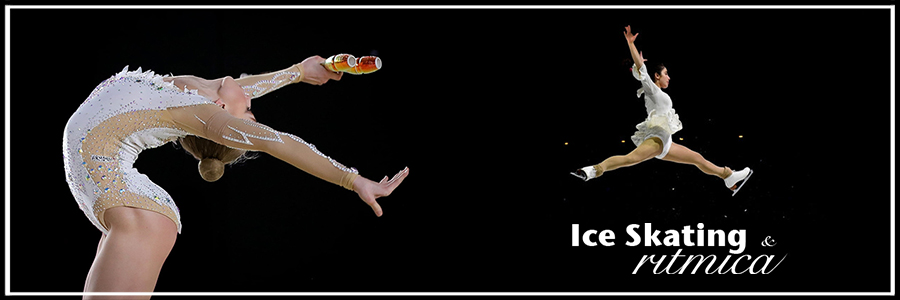-
Foffy-Gym.
User deleted
Aliya mamma
. -
GiocosaTheQueen.
User deleted
 che frugoletto frignoloso xD Congratulazioni a mamma e papà!!
che frugoletto frignoloso xD Congratulazioni a mamma e papà!!
Che differenza però da quando si è sposata (trucco a parte) .
. -
Foffy-Gym.
User deleted
ma è un bimbo o una bimba? . -
Foffy-Gym.
User deleted
. -
.
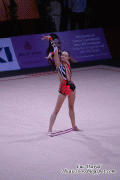
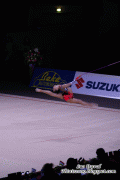



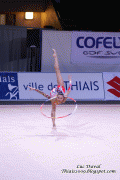

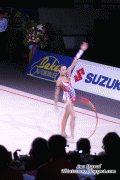
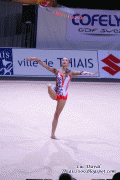

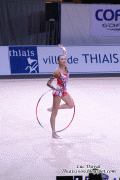

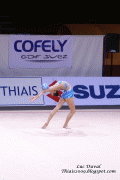
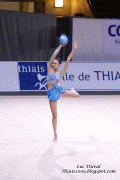
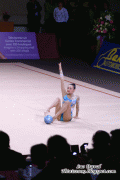
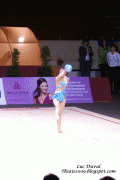 .
. -
Alessandraritmica.
User deleted
Thiais 2009 






 .
. -
Alessandraritmica.
User deleted
Sono riuscita ad avere il suo autografo a Pesaro *--*
Okkey, si, prima non me lo volevo neanche firmare! Poi per fortuna ha cambiato idea .
. -
Alessandraritmica.
User deleted
Tanti auguri ad Aliya!!! Oggi è il suo compleanno!!
E' stato bellissimo incontrarti <3. -
.
"Aliya Yussupova ha reso la ginnastica ritmica alla moda in Kazakhstan"
Fonte
Photo credit: prosportkz.kz
Aliya Yussupova si innamorò della ginnastica ritmica quando era alle elementari. Oggi, la famosa ginnasta kazaka qualificata due volte alle Olimpiadi, ha aperto un centro di ginnastica nel sud del Kazakistan, alla fine dello scorso anno.
La persistenza nel raggiungimento degli obiettivi, il garantire l'efficienza, la resistenza e la pazienza hanno aiutato Yussupova a raggiungere risultati straordinari. La flessibilità e la plasticità, che svolgono un ruolo cruciale in questo tipo di sport, hanno fatto dell'aspirante atleta una delle ginnaste più promettenti. Gli allenatori non hanno commesso un errore puntando sulla delicata e graziosa Yussupova.
"All'età di 16 anni, sono stata inviata a Mosca per migliorare le mie capacità presso l'Accademia di ginnastica ritmica di Irina Viner. Questo è il punto di riferimento più importante della mia carriera sportiva. Se non fossi andata allora, tutto sarebbe stato diverso. Non sarei mai diventata una campionessa assoluta due volte dell'Asia, una campionessa dei Giochi Asiatici, una dieci volte campionessa nazionale del Kazakistan e una partecipante ai Giochi Olimpici di Atene e Pechino. Sarei rimasta solo un ginnasta promettente" ha detto.
Yussupova è stato inviata al miglior centro di ginnastica del mondo perché la sua abilità, prontezza e voglia di andare avanti sono state notate. Nessuno degli allenatori locali si è voluto prendere la responsabilità di formare la ginnasta di talento per le Olimpiadi, come avevano paura di danneggiare la sua carriera. Un quarto di secolo fa, il Kazakistan semplicemente non aveva esperienza nel campo della ginnastica ritmica.
Gli allenatori presero la decisione giusta, anche se non era facile per Yussupova sia psicologicamente sia mentalmente. Lei era un'adolescente quando fu mandata a Mosca, dove ha trascorso nove lunghi anni, tornando a casa solo una volta ogni tanto. In quei giorni, ha chiaramente capito che qualcosa doveva essere sacrificato se avesse voluto raggiungere un obiettivo. Il suo obiettivo era quello di partecipare ai Giochi Olimpici.
Il padre, Maksut, un Master URSS di sport nella boxe, ha portato la figlia a scuola di ritmica. Si poteva prevedere un futuro luminoso per la sua bambina ed ha cercato di coinvolgerla nello suo sport non solo con il suo esempio, ma anche con esercizi quotidiani. Così, Yussupova ha onorevolmente superato l'esame di ammissione.
L'intero staff tecnico della scuola riunito per guardare la ragazza di talento e flessibile: si allungava facilmente e ha fatto le spaccate ed una flessione dorsale. Yussupova è stata avidamente ammessa ed immediatamente incluso nella lista degli allievi più talentuosi. Ogni giorno il padre l'avrebbe portata dalla scuola normale alla scuola di sport. Ha più volte detto che solo una formazione rigorosa avrebbe potuto aiutarla a raggiungere il successo e lei faceva del suo meglio per non deludere il padre.
Yussupova ha acquisito la padronanza delle sue abilità nel corso degli anni a Mosca, grazie alla formazione assieme alle stelle della ginnastica russa Irina Chashina, Alina Maratovna Kabaeva, Olga Kapranova e altre ragazze. Con la sua natura gentile, divenne amica con loro. I corsi di formazione hanno avuto luogo principalmente a Mosca, con prestazioni di tutto il mondo.
La ginnasta gradualmente ha acquisito esperienza nello svolgimento di concorsi internazionali, conseguendo i suoi primi successi. A partire dal suo debutto ai campionati del mondo del 2001 a Madrid, Yussupova è sempre stata tra le 10 migliori ginnaste secondo i risultati dell'All-around. Nel 2001, era 18° nella finale All-around, 7° a Budapest nel 2003 e a Baku nel 2005 e 6° a Patrasso nel 2007.
Le Olimpiadi di Atene 2004 sono state un altro passo importante nella carriera di Yussupova, che ha anche influenzato lo sviluppo della ginnastica ritmica in Kazakistan. Lei si è piazzata al quarto posto, cedendo il passo solo alle leader mondiali Kabayeva, Chashina e Anna Bessonova dall'Ucraina. Yussupova ha superato le ginnaste bielorusse e bulgare e Natalia Godunko, che era stato considerata il numero due della squadra ucraina.
Gli analisti dello sport hanno iniziato all'unanimità a parlare del suo enorme potenziale e della sua possibile partecipazione alle Olimpiadi del 2008 a Pechino. Arrivò quinta e rimase soddisfatta della sua prestazione, anche se non aveva ottenuto medaglie. Tra i giochi, Yussupova è diventato due volte campionessa asiatico all-around. Questo risultato è stato imbattuto per molto tempo, come nessun'altra ginnasta è riuscita a diventare campione multiplo del continente. L'anno scorso, una ginnasta coreana è diventata campionessa a tutto tondo, replicando il suo successo.
Yussupova ha preso la decisione di ritirarsi dallo sport sei anni fa, dicendo che era stata ispirata dal coaching. La scelta è stata piuttosto inaspettata per Ekaterina Panchenko, ginnasta nazionale del Kazakistan ed allenatrice di Yussupova, che ha pensato che il potenziale dell'atleta non fosse stato esaurito. La cerimonia di ritiro ha coinciso con la cerimonia di apertura di una scuola privata di ginnastica ritmica da parte di Yussupova e con l'istituzione di un torneo internazionale con premi. Viner ha approvato la scelta della sua allieva ed ha promesso di estendere ogni possibile sostegno e aiuto. Diversi anni fa, Yussupova ha guadagnato lo status di allenatrice di alto livello della squadra kazaka e di giudice di classe internazionale e si propone di condividere ulteriormente la sua esperienza con i nuovi arrivati.
"Quando ho ricevuto l'offerta di provare come allenatrice di alto livello di squadra di ginnastica ritmica del Kazakistan, non mi sono rifiutata ed ho accettato, dopo aver promesso di fare del mio meglio. Sapevo chiaramente cosa fare e avevo capito l'onere dell'impresa. Non è sufficiente inviare diversi sportivi a Mosca per la formazione per mantenere l'alto livello della ginnastica ritmica. E 'necessario sostenere altre ginnaste di talento pure. Questo è un prerequisito per successione; questo è come possiamo evitare il fallimento per anni ed assicurare la partecipazione delle nostre ginnaste alle Olimpiadi con buoni risultati. Ho sollevato la questione della necessità di stabilire una scuola di addestramento nella nostra propria terra e, grazie al sostegno del capo dello Stato, ora ce l'abbiamo ", ha detto.
Circa 200 bambini attualmente si allenano al Centro Specialistica di ritmica in Shymkent. Molti vengono dal sud, da Astana, come i loro genitori credono così tanto nelle capacità del centro che erano pronti a fare un cambiamento così drastico nella loro vita per il futuro dei loro figli. Anche ginnasti dall'estero si allenano nel centro. Dopo la performance di successo di Sabina Ashirbaeva, studentessa di Yussupova, nel campionato asiatico che ha dimostrato buoni risultati negli esercizi all-around e individuali, le squadre di un certo numero di paesi asiatici, tra cui la Corea, hanno chiesto di aderire al campo di addestramento.
Per ottenere buoni risultati Yussupova invita esperti stranieri, come le persone provenienti dalla Russia per condurre attività di formazione per i giudici ed insegnare agli allenatori le nuove regole. La ginnastica ritmica sviluppa costantemente e ogni quattro anni - al termine del ciclo olimpico - avvengono drastici cambiamenti. Il nuovo impianto sportivo ha le attrezzature necessarie per i bambini in modo che possano formarsi nella loro città natale. Pertanto Amina, la figlia di 5 anni di Yussupova, ha la possibilità di allenarsi accanto a sua madre, che è esattamente quello che ha fatto per l'anno passato.
A Yussupova deve essere dato credito per l'apertura del centro di ginnastica ritmica del Kazakistan, che può molto probabilmente essere considerato un altro dei suoi successi. Mentre lei ha una serie di vittorie, il suo successo principale è far diventare questo sport di moda nella sua stessa terra. Le sue performance spettacolari in grandi tornei del mondo hanno reso la disciplina popolare tra bambine ed adolescenti, che vogliono essere come snelle, flessibili e graziose come il loro idolo.
Grazie all'esempio personale di Yussupova, la ginnastica ritmica in Kazakistan ha raggiunto il picco di popolarità. La partecipazione su larga scala in qualsiasi sport influenzerà certamente i risultati in futuro, perché permette agli allenatori di selezionare bimbe talentuose e promettenti. Maggiore è il numero di persone che desidera allenarsi con fune, cerchio, palla e clavette, maggiore è la possibilità di trovare i futuri campioni. Questo è esattamente il desiderio del capo allenatore della nazionale: condividere la sua ricchezza di esperienza con le ginnasti in erba. Lei è un grande successo, a giudicare dal fatto che la sua pupilla 17enne ha vinto una licenza per i Giochi Olimpici di Rio. Così, dopo molti anni, il Kazakistan sarà ancora una volta rappresentata al concorso olimpico di ginnastica ritmica.CITAZIONE"Aliya Yussupova Made Rhythmic Gymnastics Fashionable in Kazakhstan"
in SPORTS on 18 JULY 2016
Aliya Yussupova fell in love with rhythmic gymnastics when she was in firstgrade. Today, the famous Kazakh gymnast and two-time Olympian chairs the specialised gymnastics centre opened in the south of Kazakhstan at the end of last year.
Persistence in achieving goals, working efficiency, stamina and patience helped Yussupova attain extraordinary results. Flexibility and plasticity, which play a crucial role in this kind of sport, made the aspiring athlete one of the most promising gymnasts. The coaches have not made a mistake by staking on the delicate and graceful Yussupova.
“At the age of 16, I was sent to Moscow to improve my skills at the Academy of Rhythmic Gymnastics of Irina Viner. This is the most important landmark in my sports career. If I had not gone then, everything would have been different; I would not have become a two-time absolute champion of Asia, a champion of the Asian Games, a ten-time champion of Kazakhstan and a participant in the Olympic Games in Athens and Beijing. I would have only remained a promising gymnast,” she said.
Yussupova was sent to the world’s best gymnastics centre because her abilities, readiness and desire to move forward were noticed. None of the local coaches wanted to take the responsibility to train the talented gymnast for the Olympics, as they were afraid of damaging her career. A quarter century ago, Kazakhstan simply did not have experience in the field of rhythmic gymnastics.
The coaches made the right decision, although it was not easy for Yussupova both psychologically and mentally. She was a teenager when she was sent to Moscow where she spent nine long years, coming home only once in a while. During those days, she clearly understood that something had to be sacrificed if one wanted to achieve a goal. Her goal was to participate in the Olympic Games.
Her father, Maksut, a USSR Master of Sports in boxing, took his daughter to rhythmic gymnastics school. He could foresee a bright future for his child and tried to engage her in sports not only by his own example, but also by daily exercises. Thus, Yussupova honourably passed the entrance examination.
The school’s entire coaching staff gathered to watch the talented and flexible girl. She easily stretched and did the splits and a backbend. Yussupova was eagerly admitted and immediately included in the list of the most talented trainees. Every day her father would pick her up from regular school to take her to the sports school. He repeatedly told her only rigorous training could help her achieve success and she tried her best not to disappoint her father.
Yussupova mastered her skills during the years in Moscow, training together with Russian gymnastics stars Irina Chashina, Alina Kabayeva, Olga Kapranova and other girls. With her gentle nature, she became close friends with them. Trainings took place mostly in Moscow, with performances around the world.
The gymnast gradually gained experience in performing at international competitions, resulting in her first successes. Starting with her debut at the 2001 world championships in Madrid, Yussupova has always been among the 10 top gymnasts following the results of the all-around. In 2001, she was 18th in the all-around final, seventh in Budapest in 2003 and in Baku in 2005 and sixth in Patras in 2007.
The 2004 Athens Olympics were another important step in Yussupova’s career that also influenced Kazakhstan’s development of rhythmic gymnastics. She ranked fourth, giving way only to world leaders Kabayeva and Chashina and Anna Bessonova from Ukraine. Yussupova advanced beyond Belarusian and Bulgarian gymnasts and Natalia Godunko, who had been considered number two on the Ukrainian team.
Sports analysts unanimously started to speak about Yussupova’s huge potential and her possible participation in the 2008 Olympics in Beijing. She placed fifth and was satisfied with her performance, although she was not among the medallists. Between the Games, Yussupova twice became the Asian all-around champion. This achievement has been unbeaten for a long time, as no other gymnast managed to become the continent’s multiple champion. Last year a Korean gymnast became an all-around champion, replicating her success.
Yussupova made the decision to retire from sports six years ago, saying she was inspired by coaching. The choice was quite an unexpected one for Ekaterina Panchenko, Kazakhstan’s rhythmic gymnastics national team and Yussupova’s coach, who thought the athlete’s potential had not been exhausted. The retirement ceremony coincided with the opening ceremony of a private rhythmic gymnastics school and international tournament with awards from Yussupova. Viner approved her trainee’s choice and promised to extend every possible support and help. Several years ago, Yussupova gained the status of as the Kazakh team’s senior coach and international class judge and intends to further share her experience with newcomers.
“When I got an offer to try as a senior coach of Kazakhstan’s rhythmic gymnastics team, I did not refuse and agreed having promised to do my best. I clearly knew what to do and realised the burden I was undertaking. It is not enough to send several sportsmen to Moscow to train to maintain the high level of rhythmic gymnastics. It is necessary to support other talented gymnasts as well. This is a prerequisite to succession; this is how we can avoid failure for years and ensure the performance of our gymnasts at the Olympics with good results. I raised the issue of the need to establish our own training ground and thanks to the support of the head of state, now we have it,” she said.
Approximately 200 children currently train at the specialised rhythmic gymnastics centre in Shymkent. Many come to the south from Astana, as their parents believe so much in the abilities of the centre’s head they were ready to make such a drastic change in their lives for the future of their children. Foreign gymnasts also rely on the centre. Following the successful performance of Sabina Ashirbaeva, Yussupova’s trainee in the Asian Championship who demonstrated good results in the all-around and individual exercises, teams from a number of Asian countries, including Korea, asked to join the training camp.
To achieve good results Yussupova invites foreign experts, such as individuals from Russia who are soon expected to conduct training for judges and teach coaches the new rules. Rhythmic gymnastics develops constantly and every four years – at the end of the Olympic cycle – drastic changes take place. The new sports facility has the necessary equipment for children so they can train in their home town. Therefore 5-year-old Amina, Yussupova’s daughter, has the opportunity to train next to her mother, which is exactly what she has been doing for the past year.
Yussupova should be given credit for opening Kazakhstan’s rhythmic gymnastics centre, which can quite possibly be considered yet another of her achievements. While she has a number of victories, her main success is making the sport fashionable in her own land. Her spectacular performances in the world’s major tournaments have made it popular among children and teenagers who want to be as slender, flexible and graceful as their idol.
Thanks to Yussupova’s personal example, rhythmic gymnastics in Kazakhstan is experiencing the peak of popularity. Large-scale participation in any sport will certainly affect the results in the future, because it allows coaches to select talented and promising children. The more people wishing to train with a rope, hoop, ball and clubs, the higher the chances of finding future champions. This is exactly the desire of the national team’s head coach – sharing her wealth of experience with budding gymnasts. She is very successful, judging by the fact that her 17-year-old protégé won a license for the upcoming Olympic Games in Rio. So, after many years, Kazakhstan will once again be represented at the rhythmic gymnastics competition.. -
.
Dal 2013 ha cominciato ad allenare le ginnaste kazake. Ora è Head coach della ritmica kazaka.
Tra le sue allieve: Sabina Ashirbayeva e Alina Adilkhanova.
YUSSUPOVA Aliya (KAZ) |
